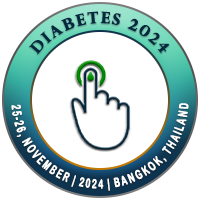
Amanda Ladron de Guevara
University of Chile , ChileTitle: Management considerations for the adult with congenital adrenal hyperplasia due 21-hydroxylase deficiency
Abstract
Congenital Adrenal Hyperplasia (CAH) is a group of genetic defects characterized by impaired cortisol synthesis. 95% of them are due to 21-hydroxylase deficiency. We will discuss only this enzyme’s deficiency. Classic congenital
adrenal hyperplasia (CAH-C) debuts in newborns or infants with primary adrenal insufficiency, some degree of clinical hyperandrogenism in newborn females, and can coexist with hypotension, hyperkalemia, and hyponatremia if there is a clinical aldosterone deficiency. The objective of this article is to update the knowledge and suggested approaches for the management of CAH-C from the beginning of its controls in the adult stage. The retrospective differential diagnosis of CAH-C and non-classical (CAH-NC) is sometimes difficult because this disease is a continuous phenotypic spectrum. Adrenal insufficiency and dependence on corticosteroid therapy are the main events to differentiate these two pathologies that have different therapeutic approaches. In adults, the treatment of CAH-C must include 2 primary objectives: adequate the replacement of adrenal failure and control of hyperandrogenism, through the use of corticosteroids in their minimum effective doses. In women there are complementary therapies for the control of hyperandrogenism, such as contraceptives and others that are in different phases of research. This makes it possible to reduce the doses of corticosteroids in some cases. It is important at the same time to address three secondary objectives: control the cardiometabolic risk of the disease secondary to corticosteroid treatment, avoid corticosteroid overtreatment and manage infertility.
The correct monitoring of treatment in adults taking in to account the objectives described, allows a better quality of life in these patients. Finally, genetic counseling must be carried out in all patients planning for children, with any type of CAH and in their partners. The study requires sequencing of the CYP21A2 gene and must be performed in a certified laboratory.
Biography
Amanda Ladrón de Guevara is a internist and endocrinologist. Studied at the university of Chile . She is Assistant Professor at the same University and she has been working for 14 years at the Endocrinology and Metabolism Laboratory of the University of Chile, conducting research on Polycystic Ovary Syndrome and its comorbidities and has published numerous studies in international journals on the matter and about Gynecoendocrinology.
Creator and Director of the first International Course on Gonadal Pathology: its impact on Female and Male health throughout life held in 2018 in Chile.
She is head of the laboratory's SOP teaching polyclinic and works at the San Juan de Dios Hospital.

